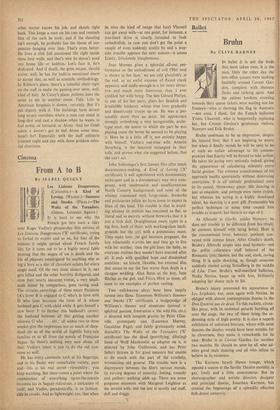Cinema
From A to B
By ISABEL QUIGLY 0 Les Liaisons Dangereuses. 05 0 (Columbia.)—A Kind of o Loving. (Warner.)—Summer g and Smoke. (Plaza.)—The g Waltz of the Toreadors.
French got into such a tizzy over Roger Vadim's present-day film version of Les Liaisons Dangereuses ('X' certificate), trying to forbid its export and so on, for fear of the notions it might spread about French family life; for it turns out to be a highly moral fable proving that the wages of sin is death and the life of pleasure unmitigated by anything else as big' a bore as a diet of chocolate eclairs for every single meal. Of the two main sinners in it, one gets killed and the other horribly disfigured, and even their nearly innocent victim, a very small- scale sinner by comparison, goes raving mad. The circular cavortings of these smart Parisians (A's lover B is engaged to C who's in love with D who later becomes the lover of A whose husband gets C with child while A gets herself a new lover F to further this husband's career; the husband between all this getting another mistress G who . . . etc. : all within two or three weeks) give the impression not so much of deep- dyed sin as of the world of highlife fairy-tale familiar to us all from the novels of Frangoise Sagan. So there's nothing very new about all that; Vadim's talent is just to do the old non- sense so well.
He has every cinematic trick at his fingertips. and in his flashy way remarkable variety, pace and—this is his real secret—viewability: you keep watching. But there comes a point where the combination of everything up-to-the-minute becomes (as in Sagan) ridiculous, a caricature of itself; and Vadim, paradoxically, is so fashion- able he creaks. And so lightweight, too, that when he tries the kind of image that (say) Visconti can get away with—at one point, for instance, a tree-lined drive is clearly intended to look cathedralish; in case you don't get the point a couple of nuns suddenly scuttle by and a way- side crucifix appears the next minute—it seems faintly, frivolously blasphemous.
Jean Moreau gives a splendid all-out per- formance as the embodiment of evil (`Her soul is shown in her face,' we are told ghoulishly at the end, as an awful expanse of flayed check appears), and oddly enough is a lot more attrac- tive and much more humorous than I ever credited her with being. The late Gerard Philipe, in one of his last parts, plays her fiendish and irresistible husband. whom true love gradually and disastrously creeps up on. He was a per- sonality more than an actor, his appearance strongly embodying a very recognisable, arche- typal man, the nearer to which the part he was playing came the better he seemed to be playing it. Here he is a little off it, not entirely happy with himself. Vadim's one-time wife, Annette Stroyberg, is the innocent entangled in their toils, and proves what she suggested before, that she can't act.
John Schlesinger's first feature film after much documentary-making, A Kind of Loving ('X' certificate), is well upholstered with documentary techniques and in a documentary way very com- petent, with unobtrusive and unselfconscious North Country backgrounds and none of the whimsy connected with fairgrounds, fireworks and proletarian jollity we have come to expect in films of this kind. The trouble is that in avoid- ing whimsy its realism has remained so flat, so literal and so entirely without fireworks that it is just a little dull. Draughtsman meets typist in a big firm, both of them with working-class back- grounds but the girl with a pretentious mum. They make love, the girl becomes pregnant, the boy reluctantly marries her and they go to live with her mother; then the girl loses the baby, so everyone realises they needn't have married after all. It ends with qualified hope and diminished ambition: an honest, likeable, but external film that seems to say the fate worse than death is a shotgun wedding. Alan Bates as the boy, June Ritchie as the girl, and Thora Hird as mum, all seem to me examples of perfect casting.
Two well-known plays have been ineptly turned into films. Tennessee, Williams's Summer and Smoke ('X' certificate), a hodgepodge of Williams's themes and situations (animal v. spiritual passion, frustration v. the wild life, etc.), is directed with lumpish gravity by Peter Glen- ville, grotesquely cast (Laurence Harvey, Geraldine Page), and fairly grotesquely acted. Anouilh's The Waltz of the Toreadors ('X' certificate) has the dead (prettifying, diluting) hand of Wolf Mankowitz as adaptor on it, is directed by John Guillermin, and has Peter Sellers thrown in for good measure but unable to do much with the part of the crochety, womanising old general. The trouble here is a discrepancy between the film's various moods, its varying degrees of intensity, feeling, comedy and pathos: nothing adds up. There are some gorgeous moments with Margaret Leighton as the invalid wife, but the rest is mostly sad stuff, dull and doggy.


































 Previous page
Previous page